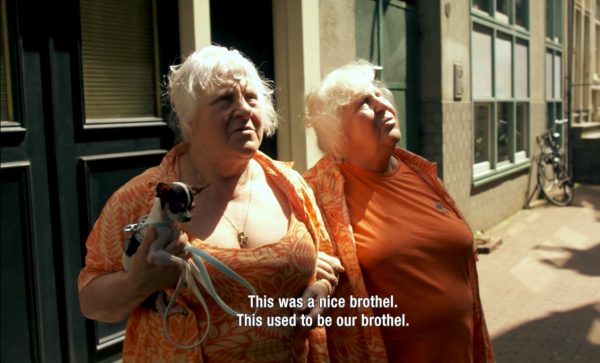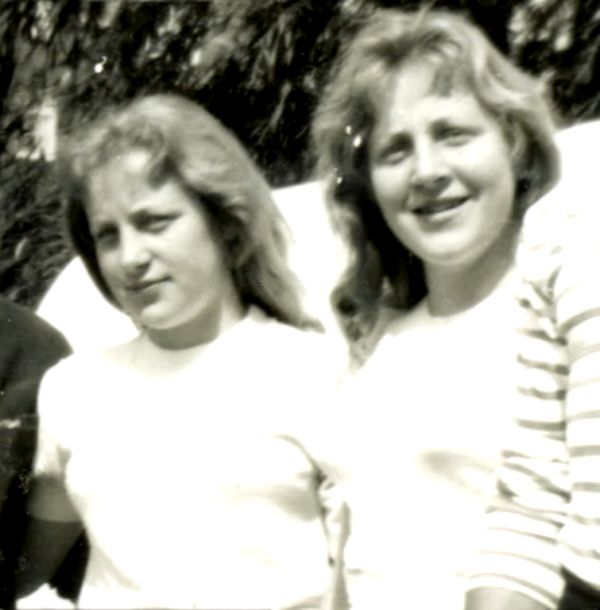
Meet the Fokkens, a 2011 documentary directed by Gabriëlle Provaas and Rob Schröde, follows the lives of Martine and Louise Fokkens, 69-year-old twins who have spent many years as full service sex workers in Amsterdam’s red light district. At the time of filming, Martine was still working, albeit reluctantly, while Louise had been retired for two years because of her arthritis. Though the documentary’s main focus is the sisters’ careers as prostitutes, we also see their homes, meet their friends, and hear pieces of their personal histories.
In addition to its focus on a fascinating topic, Meet the Fokkens also presents a charming aesthetic experience. The movie involves many scenes of the Fokkens sisters in matching outfits, and at least one of those outfits is primarily pink! Louise brings her Chihuahua with her everywhere she goes. Even if nothing else in this movie caught my attention—which is not the case—the matching outfits and Chihuahua would have been enough to enchant me. But, happily, Meet the Fokkens is as intellectually engaging as it is, well, precious. The film does more than skim the surface—it delves into sexuality and labor through the exploration of the lives of these two women.
Yes, Meet the Fokkens doesn’t skimp on pink, but it wasn’t filmed with a rose-colored lens either. Martine yearns to quit sex work, but she can’t afford to; she doesn’t have adequate savings and her government pension isn’t enough to live on. At one point she wistfully reminisces about the brothel that she, her sister, and one of their friends used to own, remarking that if big investors and the hostile government hadn’t forced them to sell their slice of the red light district, she would be sitting pretty now and wouldn’t have to keep turning tricks. Louise tells the story of how her abusive ex-husband forced her to become a prostitute, and we see her and her daughter visit the foster home where her daughter spent her childhood. So although Meet the Fokkens is generally light-hearted, it doesn’t fall into the facile sex-positive trap of making sex work look like fun and games. But it’s not all grim either: Martine has appointments with several of her clients, some of which are quite amusing, Louise goes on the aforementioned outing with her daughter, and the sisters take a stroll together through the red light district, gossiping about old coworkers and commenting on all the establishments.

Throughout all of these meandering vignettes, there are scenes of one or both of the sisters at an easel, painting quietly with an expression of blissful concentration, in a room where canvases lean on every wall. In fact, the documentary’s climax is a prostitution-themed art show, featuring the sisters’ original work. It’s wonderful that Meet the Fokkens shows sex workers expressing themselves artistically and being applauded for it. It’s rare to see media depiction of sex workers processing their feelings about their work in healthy ways, so I was delighted to be shown the Fokkens’ making and displaying their paintings. These sisters are shown as complex women who use their personal time and energy to create and share. How lovely to have it documented that sex workers are people, with lives as full and rich as any other human beings’. Yes, that’s super basic, but mainstream media is dismal when it comes to representing sex workers—especially prostitutes—as diverse and three-dimensional.
This documentary also breaks open some other stereotypes, both about older women in general and sex workers specifically. For one thing, older women can be sexual beings! Of course, since sex is the Fokkens’ job rather than a recreational activity, it’s a little different from showing an elderly lady moaning in genuine pleasure while making love to her husband. But in a way, this is even better: the sex lives of older women not only exist, but they take a variety of forms! For another, there are senior citizens who are sex workers. That may seem obvious to anyone who knows the phrase “granny porn,” but unfortunately not everyone has typed that into Google Images.
In a world where sex workers are routinely presented as murder victims, it is vitally important that this kind of media representation is promoted. In light of the tragedy of Lenora Frago’s murder and Ezekiel Gilbert’s acquittal for it, and that story’s controversial coverage, Meet the Fokkens stands up as a film that documents the full, real lives of sex workers, concealing nothing and exaggerating nothing. The Fokkens sisters aren’t treated as fuel for headlines, but rather as human beings.
I thought Meet the Fokkens was rather depressing actually. There was no real discussion or commentary on a number of things that I would have like to have seen expanded upon (eg xenophobia–we briefly see one scene where one sister is chiding another worker because she still hasn’t learned Dutch, or the strange Christian missionaries who are trying to get Martine to leave sex work).
I liked the lack of exposition, actually. My taste runs to documentaries that just show you something and let you draw your own conclusions about it. I don’t want to be lectured or moralized at by the makers of the film. But I guess that’s a subjective thing.
I can’t wait to watch this. Thank you for the review.